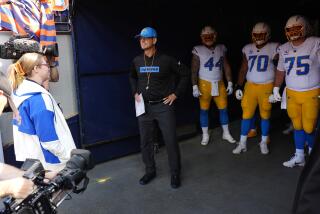When the Love of Sport Becomes Life-Threatening
- Share via
So, now what? What do you do now when your child’s life could be endangered by the very sport he or she loves so much to play? By the very physical activity through which your child stayed fit?
I am thinking of Earnest Killum today, yes. He was 20. He was special. He was popular. Not one week ago, his high school retired his jersey number. Two days later, he suffered a stroke, his second. Monday, he died. God be with him.
And I am thinking of Hank Gathers today, naturally. He, too, died young. He, too, wouldn’t quit. He, too, listened to his heart--or, rather, did not. We all still miss him.
Yet I also cannot help but think today of the living.
I am thinking of Stephen Larkin, for instance. Stevie’s big brother, Barry, plays big league baseball. Sunday, Barry agreed to a five-year contract with the Cincinnati Reds worth $25.6 million.
No wonder Stevie Larkin would like to be more like his brother.
No wonder he begged everybody to let him play.
Stevie was found to have a heart condition similar to the one that doomed Hank Gathers. Because of this, the administrators of Moeller High School in Cincinnati thought it best to prohibit him from participating further in baseball or football.
But the Larkin family fought this decision, through legal means, and won. Though not before Stevie’s mother and father spent some sleepless nights, agonizing over what to do.
One day, Shirley Larkin told her son: “Maybe you could give a sport like golf a try.”
Stevie replied: “Golf! Golf is for sissies.”
Mrs. Larkin smiled and said she simply wanted her son to stay well. But, like a young soldier or fire fighter who understands that life has risks, Stevie said: “Don’t you understand? If I die, I want to die on the baseball field.”
He is still playing.
Hank Gathers was that way. Life wasn’t fulfilling for him unless he could be doing what he most loved doing. And I suspect that’s why Earnest Killum was reluctant to give up playing basketball after his first stroke. He loved the game. He couldn’t imagine not playing.
And this is nothing new.
Joe Rhett passed out on an airplane. He was found to have a heart condition and received a pacemaker. But against all advice, he kept playing basketball for the University of South Carolina.
Ron Copeland Jr. was on the track squad at USC. He was prohibited by the school from playing because both his father and brother had died of heart attacks.
But he wanted to keep competing, as did Mark Seay, the young hero from Cal State Long Beach who stepped in front of a bullet meant for someone else. Seay was determined to return to playing college football--and did.
Some stories have happy endings. Not everybody is condemned to the same grim fate.
Other stories are unforeseeable. Mike Utley of the Detroit Lions was a healthy young man before one play on a football field left him paralyzed.
Sound bodies can die from dangerous pursuits. Unsound bodies can die from healthy pursuits.
In the same year Hank Gathers died, a Baylor football player suffering from viral gastroenteritis died during practice; a Dartmouth baseball player died of a heart attack while running laps; a Northeast Missouri State football player died of heart failure during a game and a basketball player from Central Connecticut State died of a heart attack.
Was it worth it, that at least they died doing what they so loved to be doing?
Maybe to them.
“Preventable death” is a crazy phrase, full of noble intention and informed conceit.
All I know for sure is that there are good days to be a doctor and good days to be a parent. This does not happen to be one of them.
A doctor might advise, but can he or she enforce? A parent might restrict, but should he or she relent?
My heart goes out to Earnest Killum. Playing basketball might not have taken his life, but it definitely didn’t prolong it.
Earnest, like Hank Gathers, was given a warning. A body alarm went off. But he didn’t heed it. Earnest, like Hank, wanted a second chance to live life on his own terms. Neither of them got a third chance.
I think others in similar situations should think about this. I think they should think about it a lot.
More to Read
Go beyond the scoreboard
Get the latest on L.A.'s teams in the daily Sports Report newsletter.
You may occasionally receive promotional content from the Los Angeles Times.










